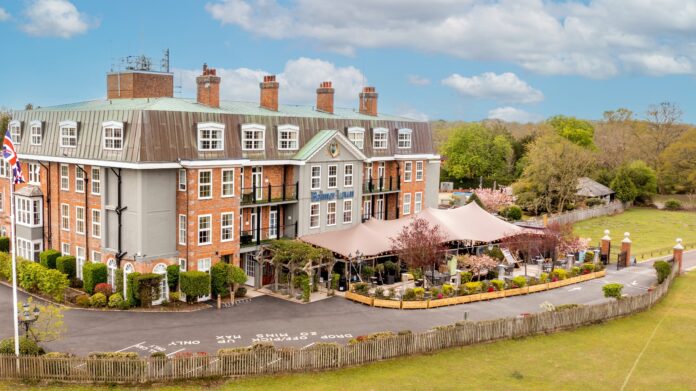By
Michael Clitheroe, General Manager at Balmer Lawn Hotel & Spa
Apprenticeships in the hospitality industry have long been recognised and championed as a powerful tool for developing the industry leaders of tomorrow. However, I think coming to the table in my position eight years ago, it wasn’t always a product that was met with huge optimism and investment. Ultimately, there wasn’t enough awareness of the long-term financial benefits that come with harnessing and developing those individuals that are going to shape the future of our sector for years to come.
Moreover, it’s important that hoteliers see the value in how apprenticeships can help contribute to reducing the strain on the business. If you’re charging the right prices and getting the right service, then guests are going to go away and think ‘wow, that was excellent’. However, if hotels are charging high prices and staff aren’t up to scratch or they’re not knowledgeable or informed, then there’s no continuity.
And guess what? Suddenly, you’ve not got a business model. It’s important, then, that hoteliers put the business on the front foot with regard to clean development. Also, I think one thing that stands out about our industry is that it’s hard-working – it’s a meritocracy. Ultimately, you get out what you put in and the right kind of qualification to feather in with all of that is naturally the ownership. It’s vocation-based and it’s over a period where the learner can see their own journey from where they were a year prior, which fundamentally, increases the likelihood of retaining key talent.
And this can be achieved in a variety of ways. It could be through marketing, strategy, finance, personnel management, or even motivation. Either way, it’s developing that mindset that I have a purpose-built team for today, but what about tomorrow? How do I ensure the business model is protected long after my time in the industry is up?
It’s all about looking at the bigger picture. If I’ve got someone going in as a trainee supervisor, then six to 12 months later, they’re coming out as a fully-fledged supervisor. As a roll-on effect, it provides autonomy and accountability throughout the business, while the individual themselves will feel trained and empowered. Everyone connected to the business, therefore, is a winner.
Furthermore, you’re promoting the longevity of staff, creating job security for them with the tools and ability to upskill, earn more money, and make the jump from staff to supervisor, for example. And who wouldn’t want that?
Everything feeds back into the business model, which has a direct effect on reputation, such as spend per head and word of mouth. This simply isn’t attainable with under-invested staff. No business model can succeed with staff that don’t have the materials to develop and deliver to themselves, their product, or the material around them. They need to be given the tools to not just do the job, but also, feel like they’re developing their knowledge and workplace application, too – which is something that I fundamentally believe in.
Of course, what makes everything work fundamentally in a successful business is its people. If I don’t have a spa therapist, for example, I don’t have a spa experience. The same applies to the kitchen, too. It takes someone with ideas and initiative to bring that dish to life – without that, everything else fails. That said, at Balmer Lawn, we pride ourselves on being people-oriented and that is reflected in our business model.
The hospitality sector is also incredibly emotional, too. It’s an industry with expectations, excitement, and anticipation, which are crucial elements that you can’t mess with. It’s a full cycle of investment and return based on product development. Our business wouldn’t be where it is today without the investment that has been made into the team.
Looking forward, we’ve got to protect the product, the customer experience, and the employee experience. These are the things that I strive to embed from the get-go. I also
believe in maintaining integrity within the product and service while avoiding exploitation within staffing and employment, as if I showcase a willingness to invest, particularly when times are tough, loyalty is repaid two-fold.
That’s precisely why apprenticeships are vital in any model for retaining talent. If you showcase belief in them, they’ll believe in your business model, too, which creates a symbiotic relationship whereby both the business and its staff are cohesively working towards the same goal.
An example of this is when I previously had members of our staff resisting poaching attempts from other hotels, despite promises of increased pay, which spoke volumes to me. The fact they believe in what we’re trying to implement on a yearly basis and prioritise their long-term career development to be part of this business model as opposed to somebody else’s, vindicated everything we’ve been looking to achieve from the moment I arrived.
That’s what sets the hospitality sector apart from the rest, and is what hoteliers must commit to protecting if our industry has any hopes of continuing to thrive. From the moment a new staff member starts their journey in hospitality, their best interests have to be at the forefront of the business plan – flexibility is everything. If someone wants to do four days a week – let’s do it. If they want to work early or just work weekends – we can do that. And we can train them in the process, too.
We need to understand that there’s a movement in the industry. To see the kind of alignment of education opportunities available as well as the vocational element of work is incredible. It creates the opportunity to learn from some of the most accomplished and respected individuals in the business, who can provide guidance and mentorship as they hone their craft.
For me, the main benefits I get from my role are developing that next pool of talent and watching people build themselves year after year. Honestly, nothing gives me more joy! To see someone come in with limited experience and then be able to strategise the business and map it down at the operational level is incredible.
It’s about implementing a hand-in-glove approach to make sure everyone connected to the business understands the model, the expectations, how we are going to get there, how they’re going to get there and, most importantly, what it’s going to take to get there. We need to make them believe in themselves, make sure it’s doable, and break it down to ensure they feel valued while they do it.
Looking at it now, the hospitality sector has turned a massive corner. To have workers in such a progressive industry, studying and learning in the most modern, inclusive, diverse and talented way from some of the best mentors the industry has to offer is very special.
It’s like a superpower. If you’ve got the right ingredients and the right person in the right environment, then the business is only going to flourish, right? That said, we’ve got a wonderful opportunity to engage with learning, being able to teach apprentices skills that they can then contribute very quickly to the world of work.
All in all, I think it’s imperative hoteliers maintain that symbiotic relationship with education providers that are continuing to transform the sector as we know it. No business can be successful without a core group of confident and talented individuals committed to exploring the endless opportunities that come in such a vibrant and fast-paced sector – which is why apprenticeships are one of the most powerful tools at a hotelier’s disposal.
Michael Clitheroe is the General Manager at Balmer Lawn Hotel, a luxury hotel & spa nestled in the heart of the ancient New Forest, close to Lyndhurst, the National Park’s natural capital.












